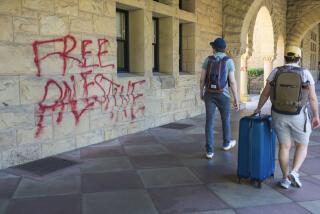Protesters back UC Irvine students against grand jury probe
- Share via
More than 50 protesters — some with masking tape plastered over their mouths — rallied in front of the Orange County district attorney’s office Tuesday, objecting to subpoenas and a grand jury investigation that could lead to criminal charges against 11 students who disrupted a speech by the Israeli ambassador last year.
The Muslim Student Union, which denied planning to obstruct the speech, was suspended by the university for one year. It was one of the first instances in recent memory where the school recommended the ban of a student group for an action other than hazing or alcohol abuse.
Some have criticized the students’ method of protest, but the “Irvine 11” have gained widespread support from students, civil libertarians and religious leaders. A top UC Irvine administrator said that university sanctions were sufficient and that the district attorney should stay out of the case.
The district attorney’s office declined to comment. The office has one year after the event to file charges.
“These students aren’t criminals, they shouldn’t have their lives ruined by criminal charges at this point,” said Carol Sobel, an attorney who has worked with the 11 students who were disciplined and represents the other six students who were subpoenaed. “And we should all move forward.”
The Feb. 8, 2010, incident sparked a debate about free speech at the campus after a group of students disrupted a speech by Michael Oren, the Israeli ambassador to the U.S. Oren was shouted down repeatedly and supporters cheered as students were escorted away by police.
Erwin Chemerinsky, the dean of UC Irvine’s law school, said the issue is not about free speech or expression but about appropriate punishment.
“I don’t think the D.A. should press charges, but what the students did wasn’t freedom of expression,” he said.
“I favor them being punished by the university because what they did was wrong,” he said, adding that “university discipline is sufficient.”
Reem Salahi, an attorney who has represented the 11 students, said a handful of students have asked her about the implications of protesting.
“It’s very terrifying that students feel that they can’t even protest,” she said. “That goes against the very grain of democracy.”
At the protest Tuesday in Santa Ana, people held signs that read, “Don’t criminalize my classmates.”
Hamza Siddiqui, a UC Irvine senior and an organizer of the protest, worries about the long-term impact of criminal charges on the students, many of whom he considers close friends. Some are graduate students and potential medical students.
“These students are super bright kids and this has the possibility of really messing up their futures,” he said.
Criminalizing protests like the one at UC Irvine could have a chilling effect on freedom of expression and make such dissent unacceptable, Siddiqui said.
Sobel said the nation has a history of heckling, noting that members of Congress sometimes stand up when the president is speaking. In many of these instances, she said, people are escorted away without criminal charges.
“It happens at City Council meetings all the time,” she said.
More to Read
Sign up for Essential California
The most important California stories and recommendations in your inbox every morning.
You may occasionally receive promotional content from the Los Angeles Times.











